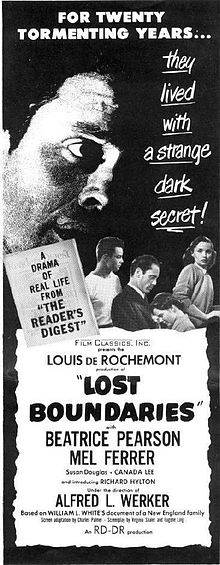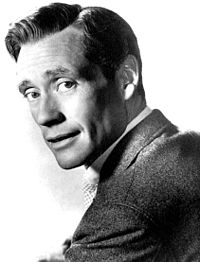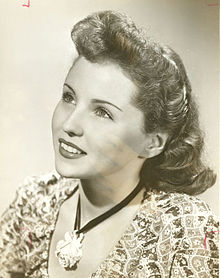Lost Boundaries
Lost Boundaries 1949 is an American film directed by Alfred L. Werker that stars Beatrice Pearson, Mel Ferrer in his first starring role, and Susan Douglas Rubes. The film is based on William Lindsay Whites book of the same title, a nonfiction account of Dr. Albert C. Johnston and his family who passed for white while living in New England in the 1930s and 1940s. The film won the 1949 Cannes Film Festival award for Best Screenplay.
Lost Boundaries focuses on the experience of their eldest son, Albert Johnson, Jr., beginning with the day Albert Sr. tells his sixteenyearold son that he is the son of Negroes who have been passing as white. The story then recounts the lives of the parents. Dr. Johnston graduates from the University of Chicago and Rush Medical College, but finds himself barred from internships when he identifies himself as Negro. He finally secures a position at Maine General Hospital in Portland, which had not inquired about his race. In 1929, he establishes a medical practice in Gorham, New Hampshire. He and his blueeyed, paleskinned wife Thyra are active in the community and no one suspects their racial background, at least not enough to comment on it or question them. In 1939 they move to Keene, New Hampshire, where he takes a position at Elliot Community Hospital. At the start of World War II, he applies for a Navy post as a radiologist but is rejected when an investigation reveals his racial background. Struck by this rejection, he then shares his and his wifes family history with his eldest son Albert, who responds by isolating himself from friends and failing at school. Albert joins the Navy, still passing as white, but is discharged as psychoneurotic unclassified. Albert then tours the U.S. with a white schoolfriend, visiting relatives and exploring lives on either side of the color line. Much of the book is devoted to Albert Jr.s personal exploration of the world of passing, where he learns how the black community tolerates its members who pass but disapproves of casual crossing back and forth between the black and white communities. The other Johnson children have their own problems adjusting their new identity and the acceptance and rejection they experience. Finally, Albert Jr., attending the University of New Hampshire tells his seminar on international and domestic problems that perhaps he could contribute something to this discussion of the race problem by telli
Source: Wikipedia



